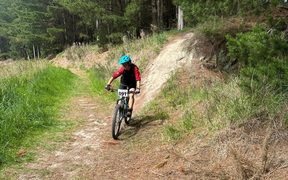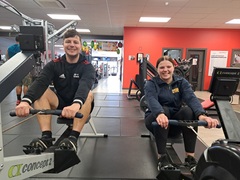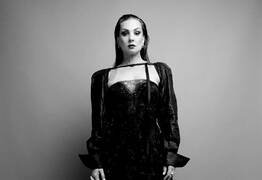Community rallies to help Aoife find her feet
Ashley Smyth
24 October 2024, 6:00 PM
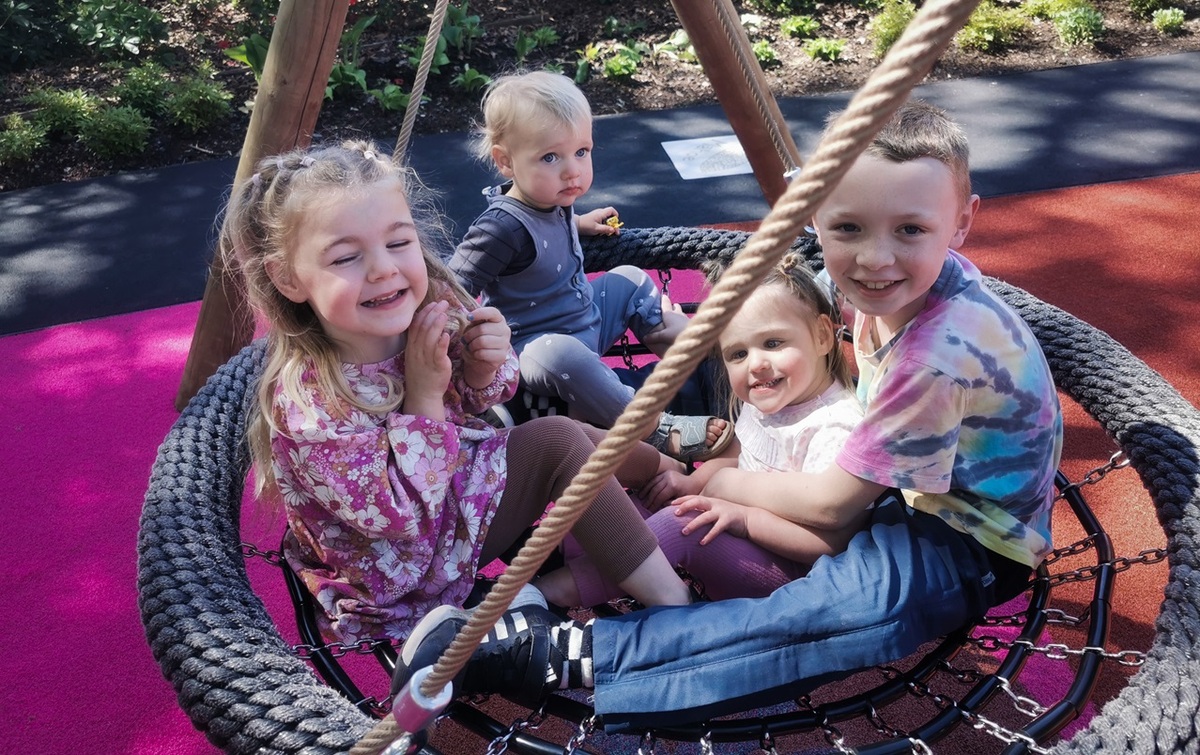 The Coster kids (from left) Margot (4), Mac (1), Aoife (2) and Cooper (8). Photo: Supplied
The Coster kids (from left) Margot (4), Mac (1), Aoife (2) and Cooper (8). Photo: SuppliedNo parent wants there to be a gap between what they can provide and what their child needs, says Ōamaru mother Bridget Coster (4-minute read).
Aoife Coster is a bright, chatty two-year-old who likes to play with her dolls and bounce with her siblings on the trampoline.
But Aoife can’t walk, and her parents Bridget and David Coster are now battling to raise the money to give her that chance.
Aoife was born at 25 weeks’ gestation. On top of the health complications that causes, she is also the surviving twin from twin-to-twin transfusion syndrome.
This only happens in identical twin pregnancies, when the two babies receive an uneven share of the blood flow from their shared placenta. One twin receives too much blood, while the other doesn’t receive enough.
The condition in this instance was diagnosed as stage four, which made treatment more complicated.
A laser ablation procedure to fix the problem went wrong, and rather than even out the blood flow between the two babies, it reversed it, Bridget says.
“Aoife was the twin who was getting too much blood for the whole of the pregnancy and that is actually usually the twin that passes away. But then she became the twin that wasn't getting enough blood . . . and their bodies had got so used to the uneven flow, for it to change was not great.”
Even though an emergency c-section was performed, it wasn’t quick enough to save Aoife’s sister Eveline, who died in utero.
While devastating in its own right, Eveline’s death was also catastrophic for Aoife, who then began to haemorrhage.
“It was really horrific,” Bridget says. “Which is why she has her brain injury . . . She has brain damage from anaemia (lack of blood) to the brain.”
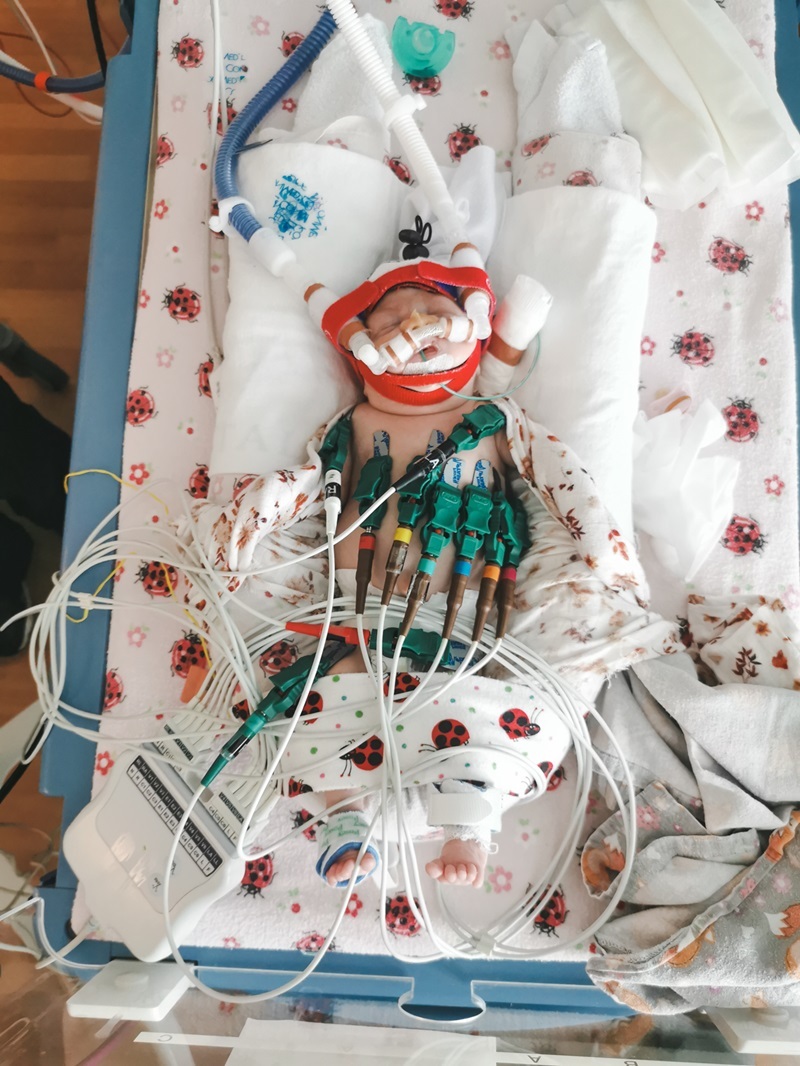
Baby Aoife. Photo: Supplied
This loss of blood supply caused similar damage to a brain bleed, and the result was cerebral palsy - which affects the function of Aoife’s limbs - leaving her unable to walk.
She also has chronic lung damage stemming from her premature birth, and Bridget says she was initially diagnosed as profoundly deaf - although watching the pair interact, it is obvious she is not.
“Every time her hearing is tested, it changes, but apparently, [deafness] can be a twin-to-twin transfusion thing as well.”
Aoife has had two laser eye surgeries. Her eyesight was affected by her brain injury, and made worse by the length of time she had to be on oxygen while in the Neonatal Intensive Care Unit (Nicu) waiting for heart surgery.
“She was ventilated for nine weeks . . . They say two weeks is a really long time, so nine weeks is not good. It's kind of like, will they ever come off?” Bridget says.
Following her heart surgery at Starship Hospital, still six weeks premature, Aoife could be safely removed from the ventilator but continued to require supplementary oxygen for another year at home.
Now, almost three, Aoife can tip-toe behind a walker, and her parents’ mission, is to get their daughter to the Centre for Movement in Queensland, Australia in the hopes it can help her walk.
Bridget and David became aware of the therapy centre through another Ōamaru mother and friend, Hayley Casey, who had a baby in Nicu the same time they were there with Aoife.
Hayley is also in the process of trying to get her son Billy, who has already benefited from one three-week block of intensive therapy, back to the centre, after her disability funding was cut.
The centre provides intensive paediatric therapy at a level unavailable in New Zealand. A three-week block involves three hours of therapy a day, five days a week.
Results from the centre have been amazing, showing an increase in long-term outcomes for children with conditions affecting their brains.
“For children with brain injuries, early and consistent therapy can dramatically influence their long-term development,” the centre’s website says.
“By stimulating the brain’s natural capacity to adapt and rewire, these therapies enable children to achieve key milestones like sitting, standing, and walking – milestones that may otherwise seem out of reach.”
Due to the number of New Zealand patients visiting the centre, a "pop-up" has been run in Christchurch once a year by the centre.
Aoife’s care originally fell to the Southern District Health Board, but although the Accident Compensation Corporation (ACC) has just agreed to cover her care in the last year, help to pay for this therapy has been repeatedly declined, Bridget says.
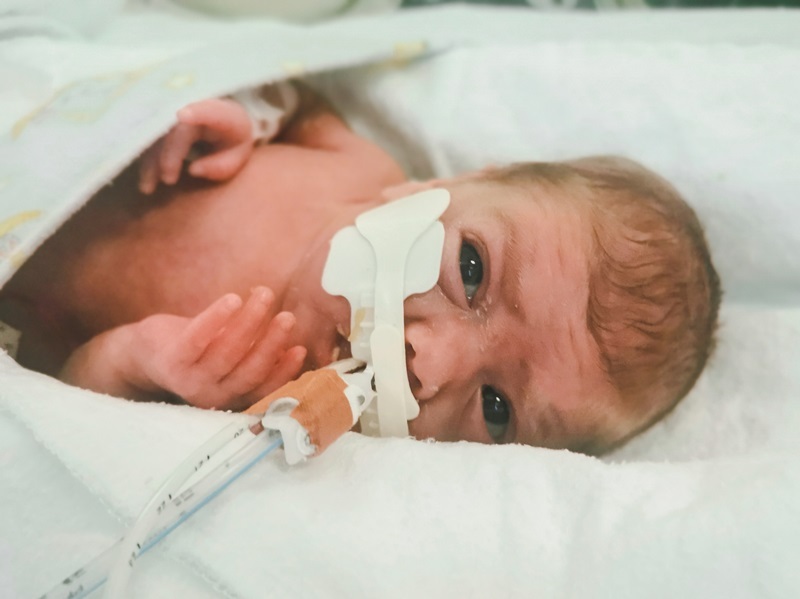
A tiny Aoife on a ventilator. Photo: Supplied
Last time the centre came to Christchurch, Bridget and David “really held out for the funding”.
“Then we just didn't have any time left to organise it for ourselves, which is a shame, because this time it's way more expensive than just popping up to Christchurch.”
A Rotorua branch of Centre of Movement is opening in December next year, which means there will not be another Christchurch clinic before then, and time is of the essence for Aoife to get the most benefit.
Her paediatrician, orthopaedic surgeon, physio and occupational therapist are in agreement this is the time to achieve the best results, Bridget says.
“She's trying to walk. She's at that good developmental age. Like, ideally, she would have already been. So we just can't wait around any more.
“So we've gone, ‘okay, let's do it. We've got to do it’.”
Aoife is booked into the Brisbane centre in March. Their fundraising target is $20,000 with a good amount raised already, Bridget says.
The cost for the treatment is approaching $10,000, and on top of that, there are travel and accommodation costs for the family of six, which also includes Cooper, eight, Margot, four, and Mac, who is one.
“Whatever we raise will just go towards us going, because we're going regardless and we will cover as much of the cost as a family as possible.
“So hopefully, actually, the fundraising will go towards getting her there twice, because we're like, 'if she's going to make a big gain, we don't want to not go again'.”
Bridget says they have never been given a good reason why their funding applications have been declined.
“Not satisfying ones. Not satisfying at all.
“They say there's no evidence that intensive therapy is any better than what is available here in New Zealand. That is the latest reason we were given, and that is with providing all of the evidence from her six specialists involved in her care.”
The therapists often change, and some have no experience in paediatric therapy and/or with cerebral palsy patients.
“She gets physio, but it's never regular, and my view on it is, when . . . any wee baby starts to walk, they're practising it every day, so if you need specialist input, then you need some sort of period of time where you've got support every day.
“And getting her walking now will mean more independence for life,” Bridget says.
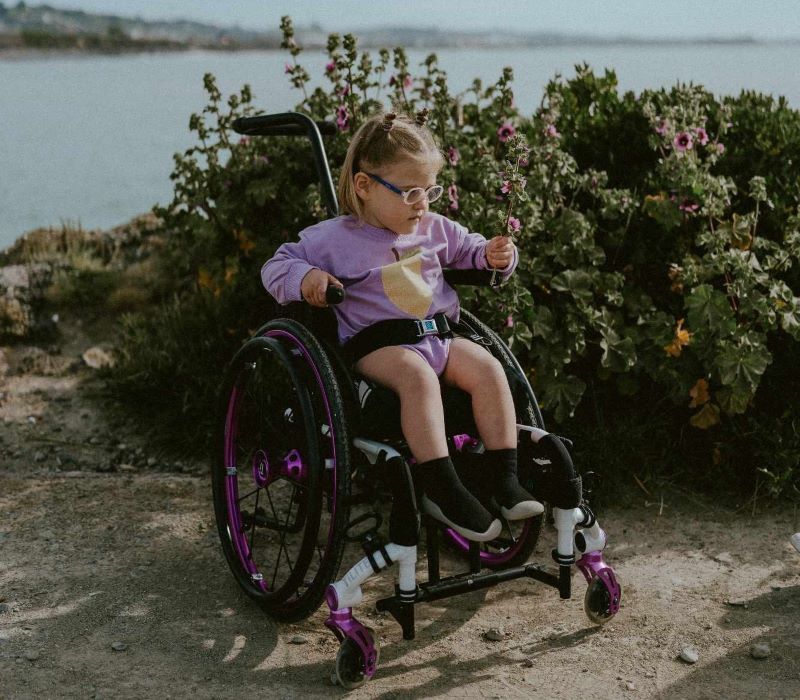
Two-year-old Aoife Coster. Photo: Supplied.
Aoife is “very motivated” and determined to keep up with her siblings, and does well despite her challenges, Bridget says.
To get to the Centre of Movement, the Coster family has had to call on the community for help.
Bridget initially asked one of Aoife’s Nicu nurses from Dunedin who, with her sister, sings as the country music duo Sisterhood, and they were happy to help.
Other businesses offered vouchers and experiences to be auctioned off, while Yanina and Pablo Tacchini offered their restaurant Del Mar as the venue to host a fundraising evening on November 29, with a Texan barbecue.
“Sharni (Yanina) got back to me… and I was blown away. I still am . . . because, you know, I don't know her, but she just … she's amazing.”
“And then she suggested to get art donations, and I sent a letter to local artists, and then they have blown us away as well.”
Ōamaru’s Matthew Wicks, Sharon Murcott and Al Bell, and Dunedin artist Robert Scott have donated work which will also be auctioned off.
A movie fundraiser held earlier this month raised more than $2500 for Aoife’s cause, and Placemakers Ōamaru has contacted Bridget and offered to run a Show and Shine event in its carpark, on November 23, from 10am to 12 noon.
The event offers car and motorbike owners the chance to “Show off their toys” for a $10 donation.
Thames Street's Waitaki Interiors is holding an in-store raffle for a blanket, and there is also a Givealittle page that has been set up for the Costers by a friend.
Bridget and David are incredibly grateful, she says.
“We just feel really lifted up by the community, because you want the best for your child.
“No parent wants there to be a gap between what they can provide and what their child needs, but the community has gone, ‘hey, we'll help you’, and that has been the best bit.
“The people that have come forward to help, it's always not who you expect. And, yeah, whether it's a massive dinner or a $5 donation, it all means so much.”
The community support also helps the Costers “feel believed in”, during what is a lonely time, Bridget says.
Bridget hopes if Aoife makes significant progress at the Centre of Movement, funding might become available for future visits, although she knows of a mother whose daughter has been to the centre nine times and is still fighting ACC to fund that retrospectively.
What the future has in store for Aoife is uncertain. Developmentally she appears on par with her siblings. She likes counting and reciting the alphabet.
Bridget says whenever they ask doctors directly, they can’t or don’t want to give her an answer.
“I think that's also because she has all her things, like, it's not just cerebral palsy. Her chronic lung disease and all of that play a big part in her health, so I think it's hard for them to.
“She'll just be her.”
ACC Service Delivery deputy chief executive Michael Frampton provided the following statement in response to Bridget's comments.
"I am sorry to hear of Aoife’s condition and recognise the ongoing impact this has on her and her family.
"ACC is funding a comprehensive treatment and rehabilitation package, and we have worked with her family to find suitable local providers. We are aware concerns have been raised about aspects of these programmes and we will continue to work with Aoife’s family and the providers to address these.
"Additional funding for the Centre of Movement’s pop-up clinic was declined because, under Aoife’s Training for Independence programme, the same rehabilitation needs are being met."
"I understand this decision has been disappointing for the family, but ACC cannot fund two concurrent programmes for clients that have the same purpose. We also cannot fund any treatment provided outside of New Zealand.
"Aoife’s condition means she will have life-long support from ACC and we will continue to work with her family to ensure we are providing the best support possible."
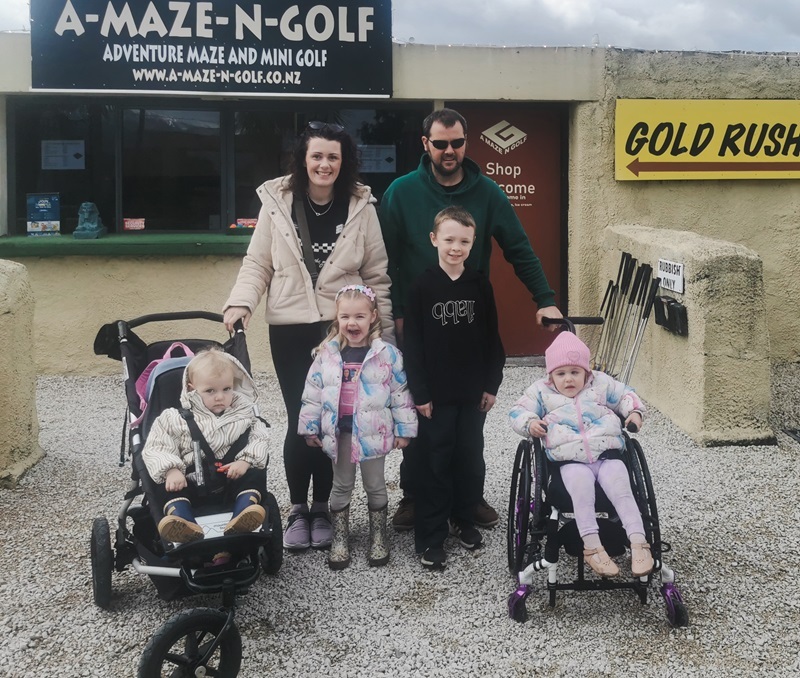
The Coster family on a day out. Photo: Supplied
NEWS
MUSIC
